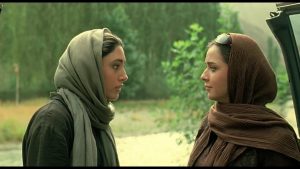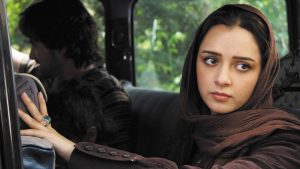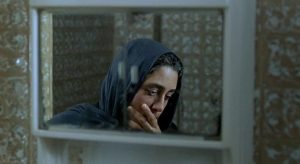About Elly (2009)

About Elly (2009), directed by Asghar Farhadi, is a masterfully crafted Iranian drama that delicately balances themes of social responsibility, truth, and morality. The film is a deeply human and suspenseful exploration of interpersonal relationships, set against the backdrop of an Iranian seaside vacation gone tragically awry.
Plot Overview
The story begins with a group of middle-class Iranian friends who embark on a trip to the Caspian Sea. Among them is Sepideh (played by Golshifteh Farahani), who has invited Elly (Taraneh Alidoosti), her daughter’s school teacher, to join the outing. Sepideh hopes to pair Elly with Ahmad (Shahab Hosseini), a recently divorced friend visiting from Germany.
What starts as a joyful retreat takes a dark turn when Elly suddenly disappears. Her absence raises questions and unravels a web of lies, assumptions, and societal pressures. The group is left grappling with guilt, suspicion, and the weight of unspoken truths as they attempt to piece together what happened to her. The film transitions seamlessly from a lighthearted social gathering to a tense psychological drama, keeping viewers on edge.
Themes
Farhadi uses the disappearance of Elly as a lens to examine deeper issues, including the societal expectations placed on women, the complexities of group dynamics, and the human tendency to evade accountability. Each character’s response to the crisis reveals layers of cultural norms and personal insecurities, challenging viewers to question their own moral compass.
The film also delves into themes of honor and reputation, particularly in Iranian society, where personal actions can have significant social consequences. The struggle between truth and deceit becomes a central conflict, as the group tries to protect themselves from judgment while uncovering the reality of Elly’s life.
Direction and Style
Asghar Farhadi’s direction is meticulous and restrained, allowing the tension to build gradually and organically. He creates an immersive experience through naturalistic dialogue and an almost documentary-like approach to filming. The use of long takes and handheld cameras draws the audience into the characters’ world, making every decision and revelation feel immediate and personal.
Farhadi’s strength lies in his ability to capture the nuances of everyday interactions, turning seemingly mundane conversations into moments charged with subtext. The unfolding drama feels universal, transcending cultural boundaries while remaining deeply rooted in Iranian society.
Performances
The ensemble cast delivers exceptional performances, grounding the film in emotional realism. Golshifteh Farahani shines as Sepideh, a character torn between her good intentions and the unintended consequences of her actions. Shahab Hosseini’s portrayal of Ahmad is understated yet impactful, offering a glimpse into his vulnerability and disillusionment.
Taraneh Alidoosti, though she has limited screen time, leaves a lasting impression as Elly. Her enigmatic presence and understated performance create an aura of mystery that drives the film’s central question: Who was Elly, and what did she truly want?
Each supporting actor contributes to the group’s dynamic, portraying a spectrum of reactions to the crisis—from panic and blame to quiet introspection. Their interactions feel authentic, reflecting the messy complexities of human relationships.
Cinematography and Sound
The film’s cinematography by Hossein Jafarian complements its themes beautifully. The windswept beaches and turbulent sea serve as metaphors for the storm of emotions and conflicts within the group. The natural lighting and muted color palette add to the realism, while the use of the camera to capture characters’ shifting perspectives enhances the sense of unease.
The soundtrack is minimal, relying on ambient sounds and silence to heighten tension. This absence of music allows the emotional weight of the characters’ decisions and conversations to take center stage.
Criticism
While About Elly is widely acclaimed, some viewers may find its pacing slow, particularly in the first act. The film takes its time establishing the group dynamic, which may feel meandering to those unfamiliar with Farhadi’s style. Additionally, the open-ended conclusion might frustrate audiences expecting a more definitive resolution. However, these choices are deliberate, emphasizing the ambiguity and moral complexity of the story.
Conclusion
About Elly is a poignant and thought-provoking film that demonstrates Asghar Farhadi’s mastery of storytelling. Its blend of social commentary, psychological depth, and suspense makes it a standout in contemporary Iranian cinema. The film’s exploration of moral dilemmas and human frailty resonates universally, offering a deeply affecting experience that lingers long after the credits roll.
For viewers who appreciate subtle, character-driven dramas with rich thematic undertones, About Elly is an essential watch. It is a testament to Farhadi’s ability to transform a simple premise into a profound meditation on truth, trust, and the complexities of human behavior.











